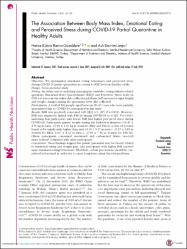| dc.contributor.author | Barçın Güzeldere, Hatice Kübra | |
| dc.contributor.author | Devrim Lanpir, Aslı | |
| dc.date.accessioned | 2022-02-24T06:07:17Z | |
| dc.date.available | 2022-02-24T06:07:17Z | |
| dc.date.issued | 2022 | en_US |
| dc.identifier.citation | Barçın Güzeldere, H. K. ve Devrim Lanpir, A. (2022). The association between body mass index, emotional eating and perceived stress during COVID-19 partial quarantine in healthy adults. Public Health Nutrition, 25(1), 43-50. https://dx.doi.org/10.1017/S1368980021002974 | en_US |
| dc.identifier.issn | 1368-9800 | |
| dc.identifier.issn | 1475-2727 | |
| dc.identifier.uri | https://dx.doi.org/10.1017/S1368980021002974 | |
| dc.identifier.uri | https://hdl.handle.net/20.500.12511/8985 | |
| dc.description.abstract | Objective: We investigated emotional eating behaviours and perceived stress during COVID-19 partial quarantine according to BMI levels in healthy adults. Design: Cross-sectional study. Setting: An online survey including demographic variables, eating attitude-related questions, Emotional Eater Questionnaire (EEQ) and Perceived Stress Scale-14 (PSS-14) was sent via online data collection platform. Self-reported weight, height and weight changes during the quarantine were also collected. Participants: A total of 506 people aged between 20-65 years who were partially quarantined due to COVID-19 participated in this study. Results: BMI was positively correlated with EEQ (r 0 center dot 205, P = 0 center dot 001). However, BMI was negatively linked with PSS-14 during COVID-19 (r -0 center dot 125, P = 0 center dot 001), indicating that participants with lower BMI had higher perceived stress during COVID-19. Participants gained weight during the lockdown situation (+1 center dot 20 +/- 1 center dot 70 kg in men; +0 center dot 91 +/- 1 center dot 40 kg in women). EEQ and PSS-14 scores of women found to be significantly higher than men (9 center dot 39 +/- 5 center dot 37 in men v. 11 center dot 17 +/- 5 center dot 85 in women for EEQ; 24 center dot 67 +/- 8 center dot 32 in men v. 27 center dot 99 +/- 7 center dot 34 in women for PSS-14). Obese participants consumed sweetened and carbonated drinks two-fold more in those compared with other participants. Conclusion: These findings suggest that partial quarantine may be closely related to emotional eating and weight gain, and participants with higher BMI showed more emotional eating behaviours. Therefore, certain precautions should be considered beforehand in order not to cause long-term eating disorder problems. | en_US |
| dc.language.iso | eng | en_US |
| dc.publisher | Cambridge University Press | en_US |
| dc.rights | info:eu-repo/semantics/openAccess | en_US |
| dc.rights | Attribution 4.0 International | * |
| dc.rights.uri | https://creativecommons.org/licenses/by/4.0/ | * |
| dc.subject | Emotional Eating | en_US |
| dc.subject | BMI | en_US |
| dc.subject | Perceived Stress | en_US |
| dc.subject | COVID-19 | en_US |
| dc.subject | Quarantine | en_US |
| dc.title | The association between body mass index, emotional eating and perceived stress during COVID-19 partial quarantine in healthy adults | en_US |
| dc.type | article | en_US |
| dc.relation.ispartof | Public Health Nutrition | en_US |
| dc.department | İstanbul Medipol Üniversitesi, Sağlık Bilimleri Enstitüsü, Beslenme ve Diyetetik Ana Bilim Dalı | en_US |
| dc.authorid | 0000-0003-0217-0938 | en_US |
| dc.identifier.volume | 25 | en_US |
| dc.identifier.issue | 1 | en_US |
| dc.identifier.startpage | 43 | en_US |
| dc.identifier.endpage | 50 | en_US |
| dc.relation.publicationcategory | Makale - Uluslararası Hakemli Dergi - Kurum Öğretim Elemanı | en_US |
| dc.identifier.doi | 10.1017/S1368980021002974 | en_US |
| dc.institutionauthor | Barçın Güzeldere, Hatice Kübra | |
| dc.identifier.wosquality | Q2 | en_US |
| dc.identifier.wos | 000752002600008 | en_US |
| dc.identifier.pmid | PMID: 34261563 | en_US |
| dc.identifier.scopusquality | Q1 | en_US |



















